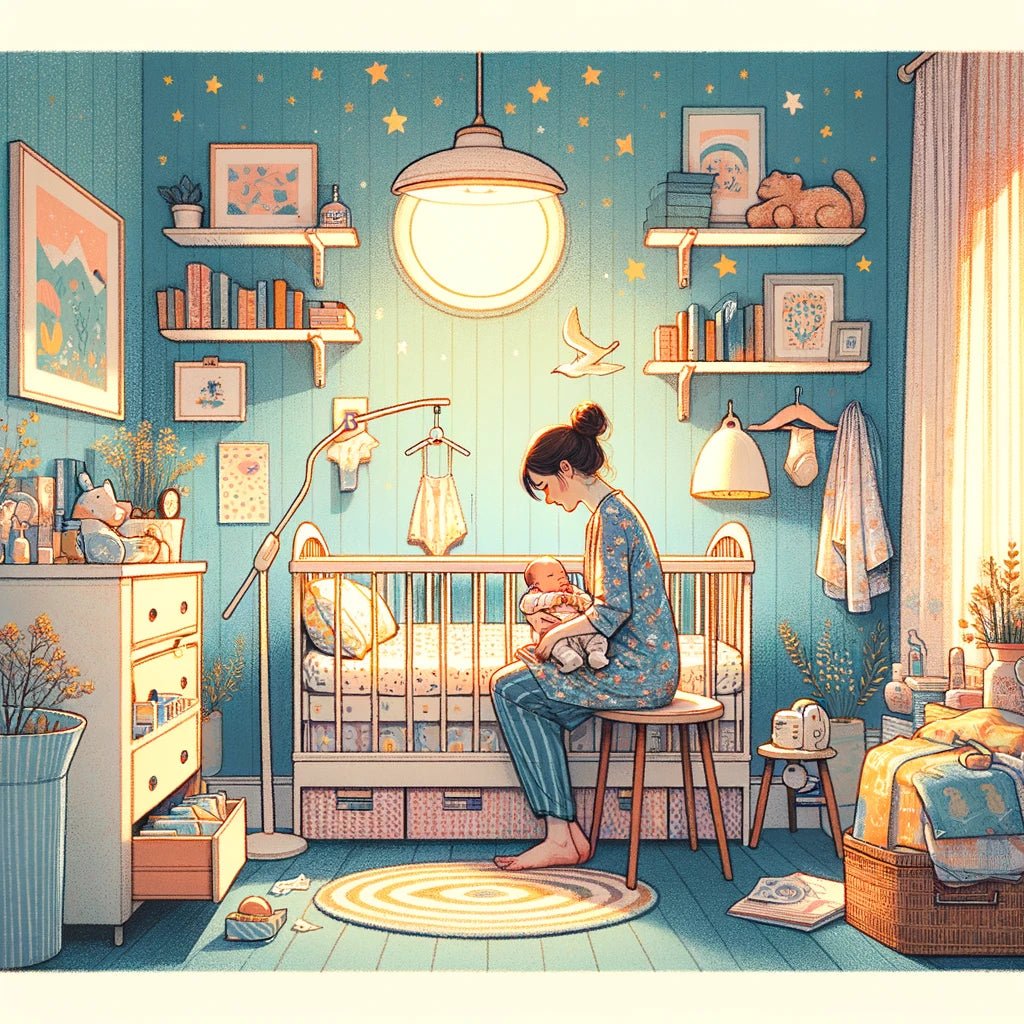
5 Secrets to Creating Magical Spaces for Your Newborn
Colors and Emotions
Color is one of the first ways your baby begins to explore and understand the world around him. The choice of colors for the bedroom is not just an aesthetic question, but can have a significant impact on the emotional and sensory development of your little one.

The Importance of the Color Palette
Warm colors like yellow, orange and red can stimulate the mind and increase feelings of happiness and warmth. However, it is important to use them in moderation, as they can also increase anxiety in more sensitive children. In contrast, cool colors like blue, green and purple tend to create a calm environment, promoting concentration and relaxation.
Tips for Choosing Colors
- Yellow : Lights up the room with a warm, sunny feeling. It's great for boosting focus and energy, but is best used with accents rather than as a dominant color.
- Blue : Promotes calm and serenity. It is perfect for bedrooms, as it helps stabilize the sleep-wake rhythm.
- Green : Represents nature and conveys a sense of balance and growth. It's great for encouraging curiosity and learning.
- Purple : Stimulates imagination and creativity. Use it in softer shades so as not to overload the environment.
Recommended Practice
When choosing the color palette for your child's room, consider the effect each color can have on their mood and behavior. Incorporate different colors in a balanced way to stimulate a variety of emotional and cognitive responses. A good place to start would be to choose a neutral base color and then add colorful accents through decorations, toys and fabrics.
Play and Learn
Play is essential for children's cognitive, emotional and motor development. Through play, little ones explore the world, learn to solve problems, develop language skills and much more. Selecting the right toys is therefore a crucial step to stimulate learning and imagination at every stage of their growth.
Choosing the Right Educational Toys
- 0 to 6 months : At this stage, newborns begin to discover their senses. Toys with high color contrasts, different textures and gentle sounds can stimulate sight, touch and hearing.
- 6 to 12 months : As babies begin to move and explore more, toys that encourage crawling, such as balls and push vehicles, or those that make sounds when handled, are ideal.
- 1 to 3 years : During this period, children begin to develop their imagination. Toys that imitate adult activities, such as play kitchens, work tools or doctor's sets, allow you to explore different roles and scenarios.
- Ages 3 to 6 : Preschoolers and school-age children benefit from games that stimulate critical thinking and creativity, such as building blocks, puzzles, role-playing games, and science experiment kits.
The Importance of Free Play
It is essential to also leave room for free play, where children can use their imagination without a specific goal. This type of game stimulates creativity, autonomy and the ability to make decisions.
Recommended Practice
When selecting toys for your children, consider those that offer opportunities for learning through play and that suit their developmental stage. Remember that the best toy is the one that supports interaction between you and your child, strengthening the bond and encouraging mutual learning.
Safety and Comfort
Creating a safe and comfortable environment is essential for your baby's well-being and development. This phase of life is characterized by great curiosity and the desire to explore, making it essential to adopt safety measures that protect children from possible dangers, without limiting their freedom of discovery.
Prioritize Security
- Furniture safety : Choose furniture with rounded corners, anchor it securely to the walls to prevent tip-overs, and make sure all materials are non-toxic and safe for children.
- Home protection : Install electrical outlet protectors, door and drawer insurance, and stairway and door safety barriers to keep children out of dangerous areas.
- Safe toys : Check that toys are age-appropriate for your child, free of small parts that can be swallowed, and made of safe, non-toxic materials.
Create a Comfortable Environment
- Lighting and temperature : Use soft lighting to create a relaxing atmosphere, especially in the evening hours. Keep the room temperature comfortable, avoiding temperature changes that could disturb your baby's sleep.
- Dedicated spaces : Organize the room with well-defined areas for play, sleep and learning. This helps children feel confident and manage their daily activities better.
- Fabrics and materials : Choose natural, breathable fabrics for sheets, blankets and clothing, ensuring comfort and preventing skin irritation.
Recommended Practice
While it is important for your child to learn and explore in a stimulating environment, safety should never be overlooked. Invest in quality products that offer both safety and comfort, without compromising style or fun.
Stories and Fantasy
Immersing children in the world of stories is a powerful way to fuel their imaginations and teach them valuable life lessons. Creating a space dedicated to reading not only encourages linguistic and cognitive development, but also offers a special opportunity to strengthen family bonds through sharing unforgettable moments.
Create a Cozy Reading Corner
- Comfort is key : Choose soft armchairs or large floor cushions to create an inviting reading nook. Make sure there is enough natural light during the day and a reading lamp for evening stories.
- Child-friendly bookcase : Place a bookcase at their height, where books are easily accessible. This encourages children to choose what to read for themselves, promoting independence and a love of reading.
- Variety of books : Offer a diverse selection of books that include classic stories, adventures, educational books, and short stories that explore different cultures. Variety stimulates curiosity and opens the mind to new ideas.

The Power of Shared Stories
- Quality Time Together : Spending time reading with your children is not only educational but also creates precious memories. These moments of sharing help build a strong emotional connection between you and your child.
- Lessons and values : Through stories, children learn important life lessons, such as empathy, courage and the importance of friendship. Discussion about the stories read can deepen understanding of these values.
Recommended Practice
Dedicating space and time to reading shows children that it is a valuable activity. By making this practice a routine, you will foster the growth of an enthusiastic reader who values stories and lifelong learning.
Nature and Wellbeing
Integrating natural elements and sustainable practices into children's daily environments not only promotes their well-being, but also teaches valuable lessons about respecting and caring for our planet. Creating spaces that reflect the importance of nature stimulates ecological awareness from an early age.
Bringing Nature Into the Home
- Natural Materials : Choose furniture, toys and decorations made from natural materials such as untreated wood, organic cotton and wool. These materials are not only healthier for children, but also add a touch of warmth and authenticity to spaces.
- Plants and greenery : Incorporating plants into the nursery improves air quality and brings a piece of nature indoors. Choose non-toxic plants that are safe for children and easy to maintain.
- Natural lighting : Maximize the use of natural light in children's rooms. Sunlight regulates circadian rhythms, improves mood and reduces energy consumption.

Promote Sustainable Practices
- Recycling and Reuse : Teach the importance of recycling and reuse through games and daily activities. Creating toys from recycled materials or giving objects a second life can be a fun craft project to do together.
- Environmental Education : Introduce concepts of conservation and environmental protection through books, games and nature excursions. Learning to respect the environment from an early age lays the foundation for a sustainable lifestyle.
Recommended Practice
Making sustainability and a love of nature an integral part of your children's lives will help them grow as conscious and responsible individuals. Every small gesture towards a more natural and sustainable environment makes a difference in their education and the well-being of our planet.






Comment
This site is protected by hCaptcha and the hCaptcha Privacy Policy and Terms of Service apply.